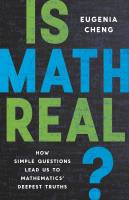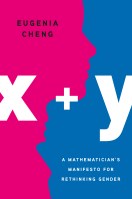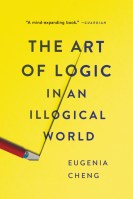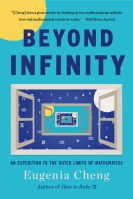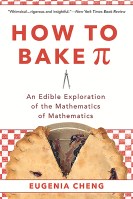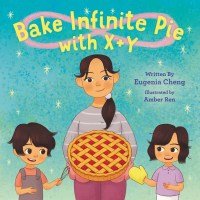Hachette Speakers Bureau – Speaker Page – Eugenia Cheng
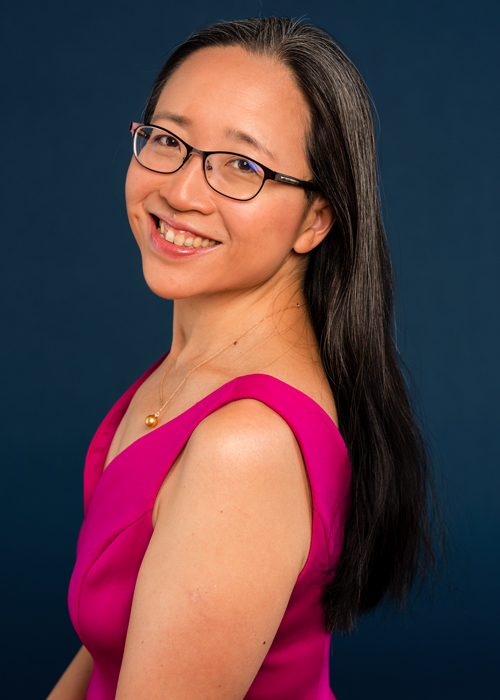
Eugenia Cheng
College/University; Children and Young Adult; Leadership; Science, Technology and Innovation; Race and Diversity; Library; Visual and Performing Arts; Journalism; Women’s Interest; Memoir;
Speaker Bio
Eugenia Cheng is a mathematician and concert pianist. She is Scientist In Residence at the School of the Art Institute of Chicago and won tenure at the University of Sheffield, UK. She previously taught at the universities of Cambridge, Chicago and Nice and holds a PhD in pure mathematics from the University of Cambridge. Alongside her research in Category Theory and undergraduate teaching her aim is to rid the world of “math phobia.” Eugenia was an early pioneer of math on YouTube and her videos have been viewed over 20 million times to date. She has also assisted with mathematics in elementary, middle, and high schools for over 20 years. Her first popular math book How to Bake Pi was featured on the Late Show with Stephen Colbert; Beyond Infinity was shortlisted for the Royal Society Science Book Prize 2017; she has also written two children’s books, and her books have been translated into 17 languages. She writes the Everyday Math column for the Wall Street Journal, and has completed mathematical art commissions at Hotel EMC2, 6018 North, the Lubeznik Center, the Cultural Center, Chicago, and EXPO Chicago. She is also a composer, and has been commissioned by GRAMMY nominated soprano Laura Strickling, and in 2022-2023 is a composer for Lynx Project Amplify, which commissions songs setting poetry by primarily non-speaking autistic poets. Eugenia is the founder of the Liederstube, an intimate oasis for art song based in Chicago. Her most recent book Is Math Real? was published in 2023 and won the Los Angeles Times Book Prize in the Science & Technology category.
FOLLOW EUGENIA
Speaking Topics
Is Math Real? How Simple Questions Lead Us to Mathematics’ Deepest Truths
Where does math come from: from rules in a textbook? From logic and deduction? Not quite. In this talk Eugenia Cheng will argue that math comes from human curiosity – most importantly, from asking questions. Many people are discouraged from asking these questions in school, thinking they’re too simple to be taken seriously, or being told that their questions are stupid. But often, these simple-sounding questions lead to wondrous mathematical revelations. Dr. Cheng will take us on a journey of discovery starting with questions like “Why does 2×3 = 3×2?” and “What’s the point of math?” leading us into research-level abstract mathematics. The journey will take us via food, music, hairstyles, and other unexpected topics, revealing how profound insights can emerge from seemingly unlikely sources, and showing that being the kid who asked “But, why does 1+1=2?” could be more important than being the kid who always got the right answers.
How to Bake Pi: Mathematics Made Tasty
Mathematics can be tasty! It’s a way of thinking, and not just about numbers. Through unexpectedly connected examples from music, juggling, and baking, Dr. Cheng shows that math can be made fun and intriguing for all, through hands-on activities, examples that everyone can relate to, and funny stories. Dr. Cheng will present surprisingly high-level mathematics, including some advanced abstract algebra usually only seen by math majors and graduate students. There will be a distinct emphasis on edible examples. Suitable for all ages including keen children.
Beyond Infinity
How big is the universe? How many numbers are there? And is infinity + 1 the same as 1 + infinity? Such questions occur to young children and our greatest minds. And they are all the same question: What is infinity? In this talk, Dr. Cheng takes audiences on a staggering journey from elemental math to its loftiest abstractions. Along the way, we will consider how to make infinite music, how to take infinite selfies, how to create infinite cookies from a finite ball of dough, and how one little symbol holds the biggest idea of all.
The Art of Logic
For thousands of years, mathematicians have used the timeless art of logic to see the world more clearly. Today, truth is buried under soundbites, spin, memes, divisive arguments and “fake news.” Seeing clearly is more important than ever. In this talk, Dr. Cheng shows how anyone can think like a mathematician to understand what people are really telling us. Taking a careful scalpel to politics, privilege, sexism, and dozens of other real-world situations, she shows that math is not just about numbers and equations, but is about thinking better, and that it can help us find clarity without losing nuance in our complex world.
X+Y: A Mathematician’s Manifesto for Re-Thinking Gender
What if we could do the impossible and remove gender from the equation? From imaginary numbers to the fourth dimension and beyond, mathematics has always been about imagining apparently impossible things. In this talk, Dr. Cheng reveals a transformative new way of talking about the patriarchy, mansplaining, and sexism: a way that empowers us to make the world a better place for all of us. This talk draws upon a combination of precise mathematical reasoning, techniques of abstract mathematical thinking, and Dr. Cheng’s personal experiences as a woman in the male-dominated field of mathematics.
Math + Music Presentations
The Square Root of 2 and the Devil in Music
The square root of 2 is one of the great conundrums of mathematics. So easy to describe but so difficult to pin down, you can run into it by accident just by folding a square in half, but what actually is it? We know it can’t be expressed as a fraction, and that its decimal expansion goes on and on forever without ever repeating itself. That is to say, it is an irrational number, a type of number that seemed to exist with anyone really knowing how for thousands of years The devil in music or “diabolo in musica” is the tritone, and it acquired this nickname in [when?] because it is the most dissonant of all intervals. In this presentation, mathematician and pianist Eugenia Cheng weaves together these two stories. With demonstrations on the piano and cello, she explains the mathematics behind harmonics, tuning, resonance and dissonance. Audiences will see how mathematical understanding of irrational numbers lead to the well-tempered tuning system that inspired Bach to write preludes and fugues in every key (twice), and how it is the square root of two itself that gives rise to the devil in music.
The Sum of the Score: Math in Music (with a singer)
Math and music are often said to be related, but does this go any deeper than the fact that they both involve counting? In this lively hybrid of talk and concert, mathematician and pianist Eugenia Cheng uncovers mathematical structures in some of her favorite pieces of classical music. She will perform works by Bach, Schubert, Schumann, Brahms, Wagner, Ravel, Debussy and Vaughan Williams. The music will be interspersed with discussion of a wide range mathematical concepts in the music including lowest common multiples, prime numbers, fractions, fractals, braids and more.
Math, Music, and “A Woman’s Life and Love” (with a singer)
This is an unusual inter-disciplinary presentation and concert, tying in themes of women in math, math in music, and music. Eugenia Cheng will talk about the unusual way her career as a mathematician has developed and will present a new song cycle she’s written on the subject. In fact, it’s an old song cycle, by Schumann, the rather outdated “A Woman’s Life and Love” for which she’s written new lyrics, updated for a modern feminist. The new version describes ambitions, achievement, imposter syndrome, hostility, bullying, the feeling of not fitting in, and the possibility of transformation, of building a new path instead of trying to assimilate into the old systems. Along with describing her experiences as a woman in math, she also discusses math in the music, the somewhat mathematical process of re-writing the lyrics, and the way that abstraction makes things more widely applicable, both in math and in poetry, so that the themes of this talk are applicable beyond feminism, to inclusivity in general.
By the Author
Booking Info
Dr. Eugenia Cheng’s speaking engagements are handled by the Hachette Speakers Bureau, a division of Hachette Book Group and an accredited member of the International Association of Speakers Bureaus. Contact us to learn more.
